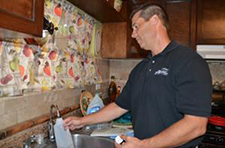Moving Pfast:
PFAS Regulatory Update TEAM Event
 The Division of Drinking Water recently announced the State Water Resources Control Board’s phased investigation approach to PFAS. It is the intention of the Board to begin the investigation by collecting PFAS detection data at 31 airports and 252 municipal solid waste landfills. These facilities have the potential to impact over 1,320 surrounding drinking water wells and drinking water sources. Further, there is new legislative pressure on the EPA to accelerate its action on PFAS nationwide. The Division of Drinking Water recently announced the State Water Resources Control Board’s phased investigation approach to PFAS. It is the intention of the Board to begin the investigation by collecting PFAS detection data at 31 airports and 252 municipal solid waste landfills. These facilities have the potential to impact over 1,320 surrounding drinking water wells and drinking water sources. Further, there is new legislative pressure on the EPA to accelerate its action on PFAS nationwide.
The fact is PFAS regulation is moving fast, which is why Babcock Labs invites you to learn more at its next TEAM Event on June 20th, 2019. This TEAM Event will feature regulatory updates from Jeff O’Keefe (Division of Drinking Water, SWRCB), as well as monitoring and treatment insights from Rob Little (Woodard & Curran).
We look forward to seeing you on June 20th for this topical and informative event! Register now.
Cleaning Up Its Act:
Will California Pass a Clean Water Tax?
 Approximately 1 million Californians currently struggle to access safe and affordable drinking water due to water agencies that are out of compliance with state standards on contamination levels or treatment techniques. Though not a new problem, new legislative attempts at the state Capitol endeavor to establish a fund for small water agencies unable to provide customers with clean drinking water because of the high treatment costs. As the San Francisco Chronicle reports: Approximately 1 million Californians currently struggle to access safe and affordable drinking water due to water agencies that are out of compliance with state standards on contamination levels or treatment techniques. Though not a new problem, new legislative attempts at the state Capitol endeavor to establish a fund for small water agencies unable to provide customers with clean drinking water because of the high treatment costs. As the San Francisco Chronicle reports:
“But several hurdles remain before the June 15 deadline for the Legislature to pass a budget — most precariously, a resistance among lawmakers to tax millions of residential water users and others while California enjoys a surplus of more than $21 billion.
Activists and Gov. Gavin Newsom have pushed to establish a dedicated clean-water fee on customers and agribusiness that would not be at risk of cuts if the economy sours. Many lawmakers, however, prefer that the money come from the state’s general fund, not another tax. (read more)
The original, unabridged version of this story was authored by Alexei Koseff and published by The SF Chronicle.
In Case You Missed It:
California's Phased Investigation Approach to PFAS (read more)
California Bans Chlorpyrifos Pesticide (read more)
Stricter Groundwater Testing Targets E.coli (read more)
On Tap in CA: PFAS Liability & Regulation (read more)
CA Snowpack Packs a Punch (read more)
When the Smoke Clears: Aftereffects of Wildfires on Communities' Water Quality (read more)
Babcock Labs is a 2018 Top Workplace! (read more
Babcock Labs Now Women-Owned ESOP! (read more)
EPA Awards Babcock Labs UCMR 4 Small Systems Contract (read more) |